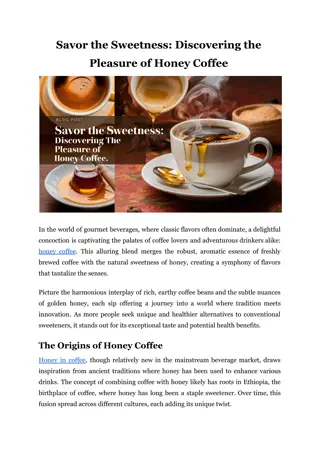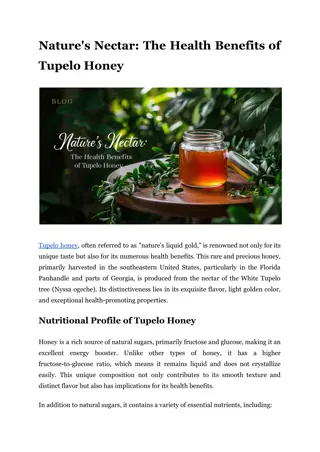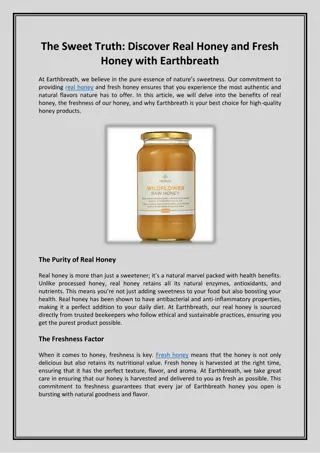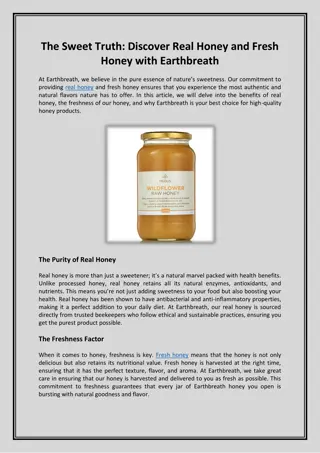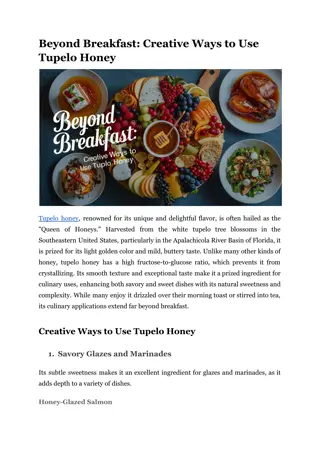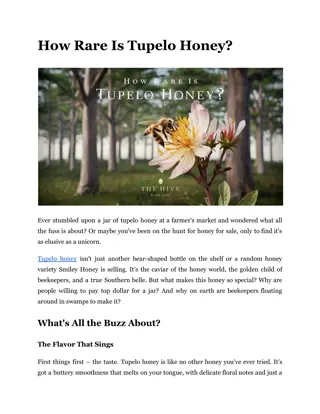
Manuka Honey_ What Makes It Unique
Explore the unique properties of Manuka honey, its health benefits, and why it stands out from regular honey.n
Download Presentation

Please find below an Image/Link to download the presentation.
The content on the website is provided AS IS for your information and personal use only. It may not be sold, licensed, or shared on other websites without obtaining consent from the author. Download presentation by click this link. If you encounter any issues during the download, it is possible that the publisher has removed the file from their server.
E N D
Presentation Transcript
Manuka Honey: What Makes It Unique Honey has been treasured for centuries as a natural remedy and sweet treat, but not all honey is created equal. Among the many varieties available, Manuka honey stands out as a true wonder of nature. Produced in New Zealand and parts of Australia, this special honey is derived from the nectar of the Manuka bush (Leptospermum scoparium). Unlike regular honey, Manuka honey has earned global recognition for its unique properties, particularly its exceptional antibacterial and healing capabilities. From soothing wounds to supporting digestive health, Manuka honey is more than just a sweetener it's a powerhouse of health benefits backed by science. But what makes it so extraordinary? What Makes Manuka Honey Unique? Manuka honey s uniqueness lies in its origin, chemical composition, and remarkable health benefits. Each aspect contributes to its status as a superfood and a sought-after natural remedy. Origin and Production Manuka honey is derived exclusively from the Manuka bush, native to New Zealand and southeastern Australia. Bees collect nectar from the delicate flowers of this bush,
producing honey rich in bioactive compounds. Its limited geographical range and seasonal production make it rare and highly valued. Unique Chemical Composition Manuka honey owes much of its reputation to its chemical makeup, which includes: 1. Methylglyoxal (MGO) A natural compound with potent antibacterial properties. The higher the MGO concentration, the stronger the antibacterial effect. 2. Unique Manuka Factor (UMF) A grading system is used to measure the honey s quality and potency. Ranges from UMF5+ (low grade) to UMF20+ (medical grade). This combination of MGO and UMF is not found in any other type of honey, making Manuka honey truly distinctive. Health Benefits of Manuka Honey 1. Antibacterial Powerhouse Unlike regular honey, which loses its antibacterial properties when hydrogen peroxide is removed, Manuka honey retains its effectiveness. This is due to the stable presence of MGO, which combats harmful bacteria, including antibiotic-resistant strains like MRSA. 2. Wound Healing Manuka honey has been used in medical settings for wound care. Its ability to create a moist environment, protect against infections, and promote tissue regeneration makes it ideal for treating: Burns Cuts Chronic wounds 3. Digestive Health Manuka honey may help manage gastric ulcers caused by Helicobacter pylori bacteria. It supports gut health by reducing inflammation and promoting the growth of beneficial gut bacteria.
4. Oral Health Studies show that Manuka honey can inhibit the growth of oral bacteria responsible for: Gum disease Plaque buildup Tooth decay 5. Anti-inflammatory and Antioxidant Properties Rich in polyphenols and flavonoids, Manuka honey offers anti-inflammatory and antioxidant benefits. These properties help protect cells from oxidative stress and reduce inflammation in the body. Applications in Daily Life Manuka honey isn t just for medicinal purposes it s versatile and can be incorporated into daily routines. As a Sweetener: Use it in teas or smoothies for added flavor and health benefits. Skincare: Apply it topically to soothe acne, hydrate skin, or treat minor burns. Immune Support: A spoonful a day may help boost immunity. Manuka Honey in Modern Medicine The use of Manuka honey extends beyond home remedies and has been embraced by modern medicine. In clinical settings, it is used for: Wound Care: Its antibacterial properties make it effective in treating chronic wounds, surgical wounds, and burns. It creates a protective barrier while promoting faster healing. Infection Control: Manuka honey s ability to combat antibiotic-resistant bacteria makes it a valuable tool in fighting infections that are difficult to treat with conventional antibiotics. The scientific validation of Manuka honey s benefits has increased its prominence in hospitals and healthcare facilities worldwide.
Culinary Uses of Manuka Honey While it is best known for its health benefits, Manuka honey also shines in the kitchen. Its rich, earthy flavor adds depth to various dishes: Breakfast Topping: Drizzle over yogurt, oatmeal, or toast for a nutritious start to the day. Natural Sweetener: Stir it into herbal teas or use it to replace sugar in recipes. Salad Dressings: Blend it with olive oil and vinegar for a unique twist on vinaigrettes. Manuka honey s distinct taste and healthful properties make it a versatile ingredient for enhancing both flavor and nutrition in your meals. How Does Manuka Honey Compare to Other Types of Honey? While Manuka honey shines for its medicinal properties, other honey varieties, like Blueberry Honey, also offer unique characteristics. Let s compare: Feature Manuka Honey Blueberry Honey Source Nectar of the Manuka bush Nectar from blueberry blossoms Antibacterial Properties High due to MGO content Moderate, relies on hydrogen peroxide Flavor Rich, earthy, and slightly bitter Sweet with a fruity undertone Health Benefits Wound healing, gut health, oral health Antioxidant-rich supports immunity Blueberry is an excellent alternative for those seeking antioxidant-rich honey with a milder flavor. However, it lacks the potent antibacterial effects of Manuka honey. Why Is Blueberry Honey Relevant? Including Honey Blueberry in this discussion highlights the diversity of honey varieties and their unique benefits. While Manuka honey is prized for its medical applications, Blueberry stands out for its fruity flavor and antioxidant content, making it a delicious
and healthy addition to meals. Comparing these two types underscores the versatility of honey and the specific roles they can play in health and wellness. Tips for Choosing High-Quality Manuka Honey To reap the full benefits of Manuka honey, it s crucial to select a genuine product. Here s what to look for: 1. UMF Certification Check for the UMF label, which guarantees authenticity and quality. 2. MGO Levels Ensure the MGO concentration matches your intended use (e.g., UMF15+ for therapeutic purposes). 3. Origin Opt for honey sourced from New Zealand or Australia to ensure purity. Conclusion Manuka honey is a standout in the world of natural remedies. Its unique origin, high MGO content, and wide-ranging health benefits make it a valuable addition to any wellness routine. While other varieties, such as Blueberry Honey, have their place, Manuka honey remains unparalleled for its antibacterial, anti-inflammatory, and healing properties. Whether used for wound care, oral health, or daily immune support, this golden nectar is truly one of nature s finest offerings. Site Article: Manuka Honey: What Makes It Unique






